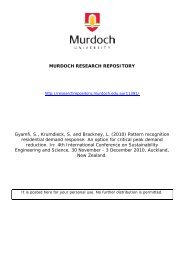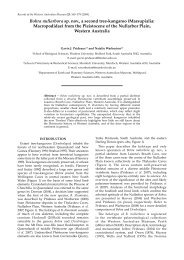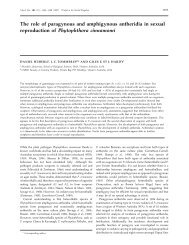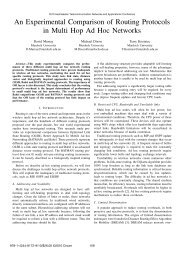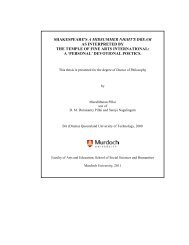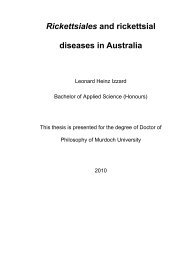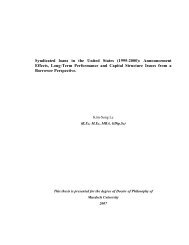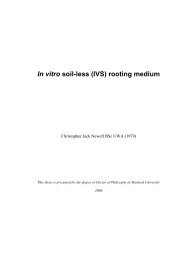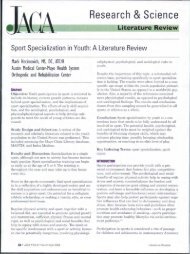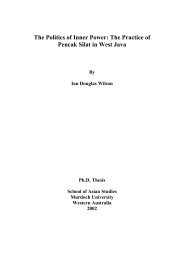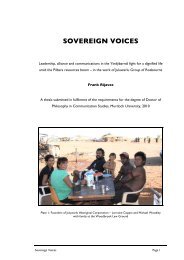National Review of School Music Education - Murdoch Research ...
National Review of School Music Education - Murdoch Research ...
National Review of School Music Education - Murdoch Research ...
You also want an ePaper? Increase the reach of your titles
YUMPU automatically turns print PDFs into web optimized ePapers that Google loves.
international and local literature (Part 2) has grounded the research in rigorous, extensive and longstanding<br />
research that establishes the benefits and value <strong>of</strong> music in the education <strong>of</strong> all Australian<br />
students in schools K-12.<br />
The snapshot <strong>of</strong> the current situation, outlined in Part 3, focused on a number <strong>of</strong> key perspectives<br />
on delivery <strong>of</strong> music in Australian schools now. In scanning the landscape <strong>of</strong> school music<br />
education, the <strong>Review</strong> highlighted a number <strong>of</strong> issues: scope and delivery <strong>of</strong> curriculum<br />
documents; provision <strong>of</strong> services for music in schools by systems and sectors; partnerships in<br />
provision; participation and achievement data, and accountability; and teacher education.<br />
In presenting this snapshot <strong>of</strong> school music it is important to recognise that there are sites <strong>of</strong><br />
excellence currently delivering effective music education to Australian students. In identifying<br />
deficits in school music it is important that these programmes <strong>of</strong> excellence are not overlooked or<br />
diminished. As a nation we need to celebrate and thank teachers, principals, parents and partners<br />
involved in these programmes. We need also to recognise the support for music provided by<br />
systems and sectors. While identifying needs for more attention and support, there is a need to<br />
acknowledge what is currently being provided.<br />
The evidence gathered during the <strong>Review</strong> pointed towards focusing on what is meant by the term a<br />
quality music education. The evidence collected in part has answered this during site visits,<br />
submissions to the <strong>Review</strong>, consultation and the development <strong>of</strong> the Guidelines for Effective <strong>Music</strong><br />
<strong>Education</strong> (Part 4). The strategic directions and recommended actions outlined in Part 5 provide a<br />
focus on leadership and action on this matter.<br />
The recommendations are substantial, reflecting the extent <strong>of</strong> the issues identified. But they are<br />
achievable providing that there is sufficient political commitment, ongoing goodwill and<br />
collaboration. The actions are targeted to a range <strong>of</strong> key stakeholders and, in most cases, reflect the<br />
need for concurrent action by different stakeholders. This multi-level approach to resolving issues<br />
is a key to bringing about the necessary change identified by the <strong>Review</strong>.<br />
All <strong>of</strong> the recommendations should be seen as a complete, necessary package. As highlighted in the<br />
Key Messages priority action is needed for:<br />
• Improving the overall status <strong>of</strong> music in schools;<br />
• Improving the equity <strong>of</strong> access, participation and engagement in school music for all<br />
students;<br />
• Improving teacher pre-service and in-service education;<br />
• Improving curriculum support services (advisory, instrumental music, vocal music and<br />
music technology;<br />
• Supporting productive partnerships and networking with music organisations, musicians,<br />
the music industry and the Australian community;<br />
• Improving music education in schools through supportive principals and school<br />
leadership, adequately educated specialist teachers, increased time in the timetable,<br />
adequate facilities and equipment; and<br />
• Improving levels <strong>of</strong> accountability.<br />
The <strong>Review</strong> highlights that the effectiveness <strong>of</strong> music in schools depends on the quality <strong>of</strong><br />
teaching, in partnership with quality support. The work <strong>of</strong> teachers is enabled through the support<br />
provided by systems, sectors, schools, principals, parents, the wider community and through<br />
partnerships with music organisations and industry. Raising the status <strong>of</strong> music education will have<br />
a positive impact on the quality <strong>of</strong> music in schools.<br />
There has been considerable debate about the seriousness <strong>of</strong> the current situation. Some on the<br />
Steering Committee argued for using the term crisis. The <strong>Review</strong> team has avoided the<br />
connotations <strong>of</strong> such language, but notes that the evidence points to this being a time when action<br />
must be taken, a critical turning point. The <strong>National</strong> Survey <strong>of</strong> <strong>School</strong>s showed that there are students<br />
in approximately 900 Australian schools (about 9-10% <strong>of</strong> schools) that have no music programme.<br />
As tempting as it might be to dismiss this number as relatively small, to do so would fly in the face<br />
<strong>of</strong> international and local research that demonstrates the need for and value <strong>of</strong> universal music<br />
education for Australian students. Besides, there is also the other evidence collected that, in<br />
addition to these 900 schools with no music, there is likely to be a significant number <strong>of</strong> other<br />
schools where music education is limited to participation. A quality music education – as identified<br />
by this <strong>Review</strong> – provides a music education that focuses on participation and engagement,<br />
extension and, ultimately, excellence.<br />
FINAL REPORT xxvii




